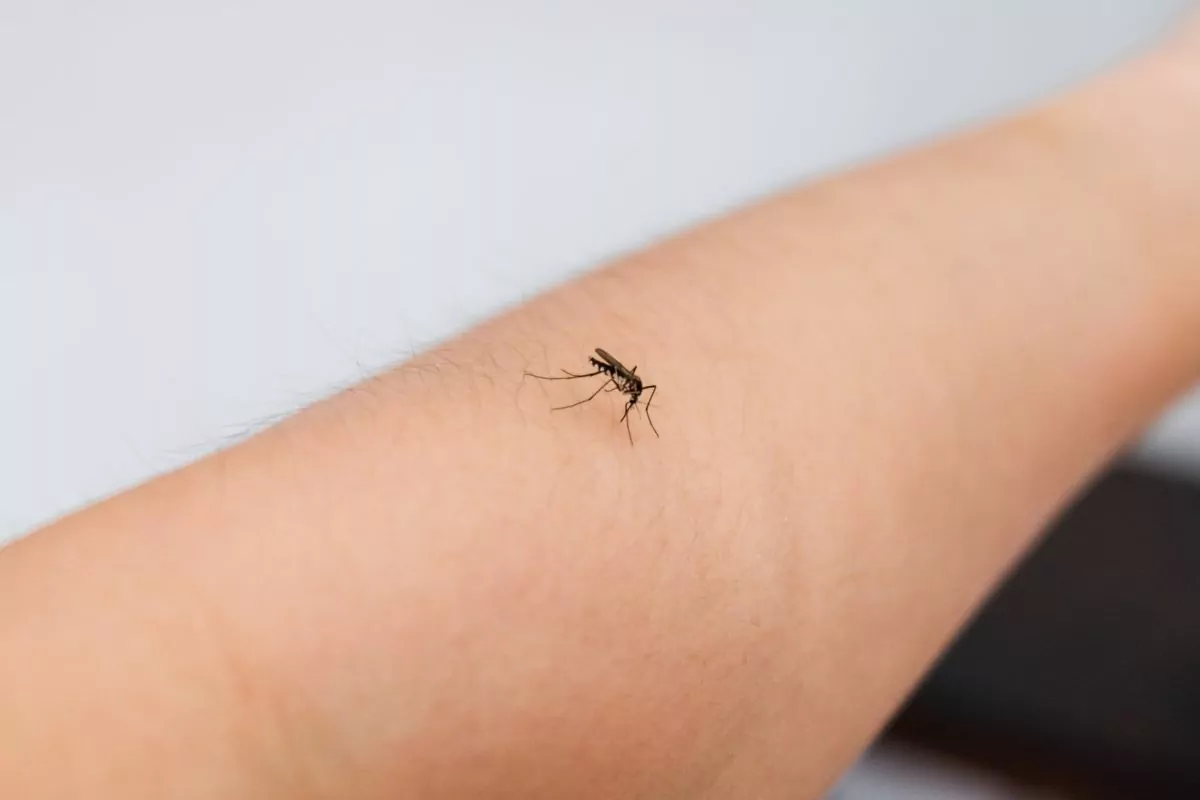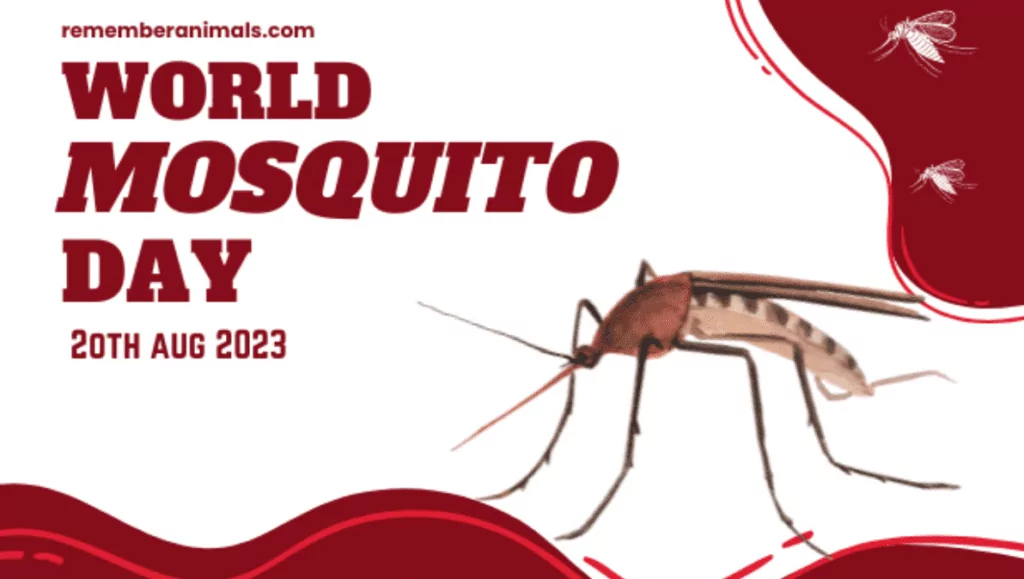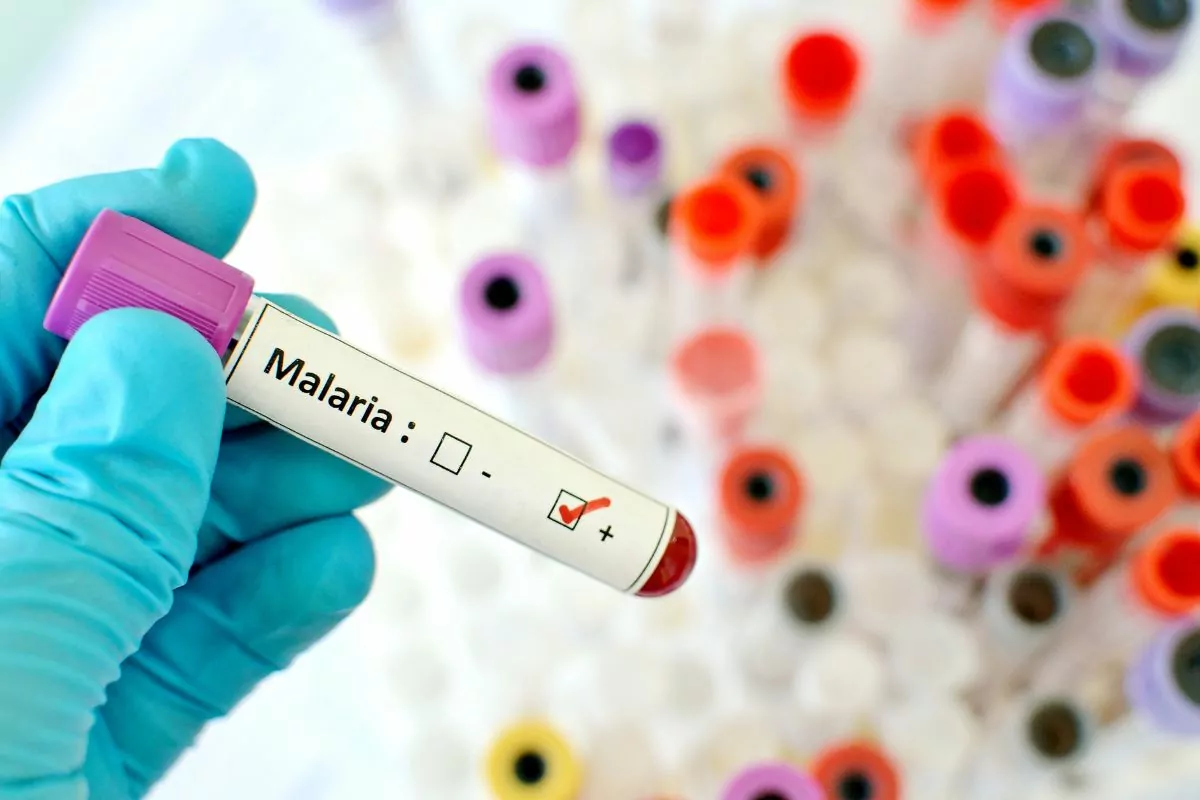What is World Mosquito Day?
World Mosquito Day falls on the 20th of August and aims to raise awareness of mosquitoes and their role in the ecosystems.
In 1897 British doctor Sir Ronald Ross discovered that the anopheline mosquito caused malaria, leading to the establishment of World Mosquito Day.
Mosquitoes are generally a menace as they transmit bacteria, viruses, and parasites that cause diseases. Millions of people worldwide get sick from mosquito-borne conditions; the mosquito is the deadliest insect in transmitting disease.

Who Discovered the Malaria Parasite?
It was in 1880 when a French army doctor called Charles Louis Alphonse Laveran first noticed the parasite inside the red blood cells of an infected person.
In 1907, Dr. Alphonse Laveran won a Nobel Peace Prize in Physiology or Medicine for discovering how parasitic protozoans cause infectious diseases such as malaria and trypanosomiasis.
Mosquito-Borne Diseases Today
Observing World Mosquito Day warrants a proper understanding of how the insects operate. Although one mosquito bite will not cause you to get sick, you may end up with an infection depending on the mosquito and region. The common symptoms of these diseases are fever, headache, vomiting, and muscle and joint pains.
Each condition will have other symptoms; it is best to get tested if you suspect you are infected. Most viral infections transmitted by mosquitoes do not have treatments or vaccines; medical practitioners will focus on treating the symptoms.
- Malaria – Is the third deadliest mosquito-borne disease attributing to over 90% of deaths in tropical Africa, especially among children.
- Dengue Fever – This is the deadliest of the mosquito-borne diseases. In more severe cases, a person will develop dengue hemorrhagic fever or dengue shock syndrome.
- West Nile virus – This is a viral disease transmitted mostly by Culex mosquitoes. It is the second deadliest of mosquito-borne diseases.
- Chikungunya – A viral disease that will disappear within a week and has no known cure. Doctors will often treat the symptoms.
- Yellow Fever – Same as many viral infections, the symptoms start improving within a week. A few people will experience severe symptoms causing the skin to turn yellow, increasing the risk of bleeding and kidney problems.
- Filariasis – Is caused by the infection with roundworms; a person infected will experience elephantiasis edema where the skin and the underlying tissue will thicken, among other symptoms. Treatment in countries outside the United States includes a combination of albendazole and ivermectin. An antibiotic treats the symbiotic bacteria which live inside the filariasis parasite.
- Tularemia – When infected, a person may have enlarged lymph nodes and skin ulcers. Antibiotics such as streptomycin and gentamicin are treatments for the disease, also known as rabbit fever.
- Dirofilariasis – A person infected will, among other symptoms, have pleural effusion when a person has an unusual amount of fluid around the lungs. The treatment is tetracycline antibiotics, and in some cases, treatment will include draining the fluid.
- Japanese Encephalitis – When infected, a person will experience little or no symptoms, but in some cases, the brain becomes inflamed. The infection will last up to 6 days. There is no specific treatment and no human-to-human transmission.
- Saint Louis Encephalitis – Closely related to Japanese encephalitis, it is mainly found in the United States and Hawaii; there are also reports in other parts of North and South America. An individual with a severe case will have a stiff neck, stupor, be disoriented, have tremors, convulsions, paralysis, and may slip into a coma. Since it is viral based, there is no cure or vaccine.
- Western Equine Encephalitis – The virus occurs worldwide in swampy areas, and an infected person rarely has symptoms. The United researched it as a biological weapon agent before suspending the program.
- Eastern Equine Encephalitis – Also known as sleeping sickness, more common among infants, adults, and older children will experience systemic illness. An infected person will experience an altered mental state, meningeal irritation, seizures, and photophobia, resulting in permanent brain damage. There is no cure, but cortisone steroids and anticonvulsants help ease the symptoms.
- Venezuela Equine Encephalitis – Humans infected will experience flu-like symptoms but can be fatal for those with weak immune systems. Although there is a vaccine, it can result in side effects and will not fully immunize a person.
- Ross River Fever – An infected person is usually asymptomatic, but others will have flu-like symptoms and a rash. The viral infection will usually run its course in 7 days, and anti-inflammatories, analgesics, and antipyretics treat symptoms.
- Barmah Forest Fever – Identified In Australia in 1974, a person will have a fever, rash, joint pain, and just general body aches. Some of these symptoms will take up to six months to clear.
- La Crosse Encephalitis – Is caused by the arbovirus, and symptoms include severe paralysis, seizures, or slipping into a coma. Others may experience permanent brain damage. Management of the disease is usually balancing fluids and electrolytes levels.
- Zika Fever – Most people infected by the Zika virus will not exhibit any or will experience mild symptoms, most of the symptoms being similar to those of dengue fever or chikungunya. The virus can be spread from mother to child during pregnancy and can lead to brain abnormalities and damage. There are no known antiviral treatments.
- Keystone Virus – Recently identified in 2018, it was first discovered in 1964 in Keystone, Tampa, and produces mild symptoms of rash and fever.
- Rift Valley Fever – can also infect animals; severe cases will result in loss of eyesight, brain infections, bleeding, and liver problems. There are currently no cures or vaccines for humans.
The Mosquito Life Cycle
Why not educate yourself this World Mosquito Day by learning more about their life cycle? Although mosquitoes are found worldwide and are different, they have a similar life cycle. The mosquito has four life cycle stages.
The life cycle starts with an adult female mosquito laying an egg on water or moist soil.
The egg then hatches into a larva, turning into a pupa. The pupa then transforms into an adult mosquito that lives for about a week and then lays eggs repeating the cycle. A female mosquito has to feed on blood to lay eggs; therefore, they will always be where there are humans and animals.
The life cycle of a mosquito may take anything between 7 to 14 days, depending on the type of mosquito.

The Disruption of Each Mosquito Life Stage
There are many ways in which humans can disrupt the life stages of mosquitoes and interfere with their natural behaviors. The elimination of mosquitoes can be at any of each of the life cycles using a unique strategy and methods.
There are many products on the market specifically to control the growth of mosquitoes. Ovicides, though not considered very efficient, are suitable for destroying mosquito eggs. Larvicides are applied directly into the water to eliminate the larva; this is the best way, as you do not want the mosquitoes to become adult mosquitoes.
Adulticides, usually spray and fogs are used to control adult mosquitoes. You can contact your local fumigation company to help you if you have mosquitoes breeding on your property.
You can take steps to prevent mosquitoes from breeding that do not involve pesticides, every day and not just on World Mosquito Day.
To prevent the mosquitoes from laying eggs and hatching larvae, remove all puddles and take care of any areas that can hold stagnant water, such as swimming pools, reservoirs, and open containers.
To control adult mosquitoes, keep the grass around your property short. Where possible, have screens on doors and windows, use mosquito nets and wear long-sleeved shirts and trousers to prevent mosquitoes from biting you.
World Mosquito Day – Malaria Pervention
Malaria is a disease caused by a parasite spread to humans through a mosquito bite. The condition is common in tropical and subtropical countries. Millions of people are infected yearly, and hundreds of thousands die of malaria infections.
The symptoms of malaria include fever, fatigue, nausea, vomiting, diarrhea, and headaches. You may also experience loss of appetite, a sore throat, and muscle pains. Malaria can also cause severe complications such as jaundice, seizures, coma, and even death. When an infected mosquito bites a person, it takes 15 days to start showing symptoms. The disease will recur months later if not properly treated.
The symptoms of malaria resemble those of other mosquito-borne diseases; which are therefore important to get tested if you suspect you have malaria.
To prevent contracting malaria, here are some of the things you can do:
- Take chemoprophylaxis which is anti-malaria medication, when you are traveling to areas that have malaria. It would be best if you started taking a few days or a week before you travel.
- Use a mosquito repellent on your skin with a concentration of DEET up to 50%.
- Use mosquito nets treated with insecticide when sleeping.
- Wear long-sleeved shirts and trousers in the evening when mosquitoes are most active
- Take care of all areas where you have stagnant water and fumigate your property consistently to get rid of mosquitoes.
If you have traveled to a malaria-prone area and suspect you have an infection, treat it as an emergency and get anti-malaria medication. Also, remember that malaria may recur, and if this happens, you will need to receive treatment again.
Facts About Malaria
Here are a few facts about malaria which you need to know
- The origin of the word malaria is from the Italian term “bad air,” used to describe marshes and swamps associated with malaria.
- Malaria comes from a parasite transmitted to humans through a mosquito bite.
- Malaria is not airborne but transmitted between humans through sharing needles, blood transfusions, and pregnancy.
- Malaria is the highest cause of death in Africa, especially among children. Malaria infects an average of 200 million people each year, of which up to 1 million die.
- Malaria is common in tropical and subtropical areas in Africa and Southeast Asia.
- Malaria is associated with poverty, and most people are not educated on the disease and do not have access to preventive and treatment resources.
- Malaria is curable; there are various drug treatments available; however, drug resistance strains are a threat to these current treatments.
- Once infected with the malaria parasite, it takes up to 15 days for the symptoms to show. You need to get tested and get treatment immediately if you suspect you have malaria.
- In 2021, a vaccine for malaria known as Mosquirix was approved and recommended by the World Health Organization (WHO) for large-scale use for children in high, moderate, and high-risk malaria areas. A person will need four injections to be fully immunized.
- The mortality rate of malaria deaths is declining globally.
- The best way to not contract malaria is through prevention. Preventative measures include fumigation, sleeping under a treated mosquito net, covering hands and legs at night, and taking anti-malaria medication.
- The P. falciparum causes the most severe malaria cases, specifically cerebral malaria.
- If left untreated during pregnancy, malaria can result in stillbirths, infant immortality, miscarriage, and low birth weight.
- Only female anopheles mosquitoes will bite humans to produce eggs for reproduction; male mosquitoes do not bite humans. Mosquitoes will generally feed on flower nectar.
- The mosquito’s proboscis inspired researchers to develop a hypodermic needle considered painless.
- Ever wondered where do mosquitoes go during the day? Mosquitoes are typically most active during the dawn and dusk hours when temperatures are cooler, and humidity is higher. During the day, they tend to rest in cool, dark, and damp places such as bushes, tall grasses, and shaded areas.

Celebrating World Mosquito Day
There are over 3,500 species of mosquitoes, but not all of them carry pathogens that cause diseases. However, the few mosquito species that transmit diseases are considered the deadliest animal in the world as they kill more people than human murderers. So is there any reason to celebrate them?
World Mosquito Day is not a celebration of this insect; instead, it is a day to commemorate the work done in the research of the diseases caused by mosquitoes and also raise awareness.
Raising awareness about mosquitoes and the diseases they carry is important. For more information, check out this world mosquito map website with some valuable information.
Here are some of the things you can do to celebrate World Mosquito Day:
- Learn and share information about mosquitoes, how they transmit diseases, and how to prevent yourself and others from getting infected.
- Participate in raising funds and donations to organizations that research vaccines and medication.
Parting Words
Mosquitoes are a nuisance and transmit many deadly diseases. The best way to not get infected is through prevention. This can be done by keeping your property clean of standing water to prevent mosquitoes from laying eggs.
Consider fumigating with an insecticide, wear long sleeves, use mosquito repellent and sleep under treated mosquito nets.
Mosquito-borne diseases can be fatal. If you suspect you have an infection, seek medical help immediately.
World Mosquito Day serves as a reminder of the significant impact that mosquitoes can have on our health and well-being. While these tiny insects may seem like a minor annoyance, they are responsible for spreading deadly diseases such as malaria, dengue fever, and Zika virus.
By raising awareness and promoting education about mosquito-borne illnesses, we can work towards reducing their impact on our lives. Additionally, by taking steps to eliminate standing water and using mosquito repellents, we can help protect ourselves and our communities from these diseases.
World Mosquito Day provides an opportunity for us to come together and take action to prevent the spread of mosquito-borne illnesses, ultimately improving the health and quality of life for people around the world.
